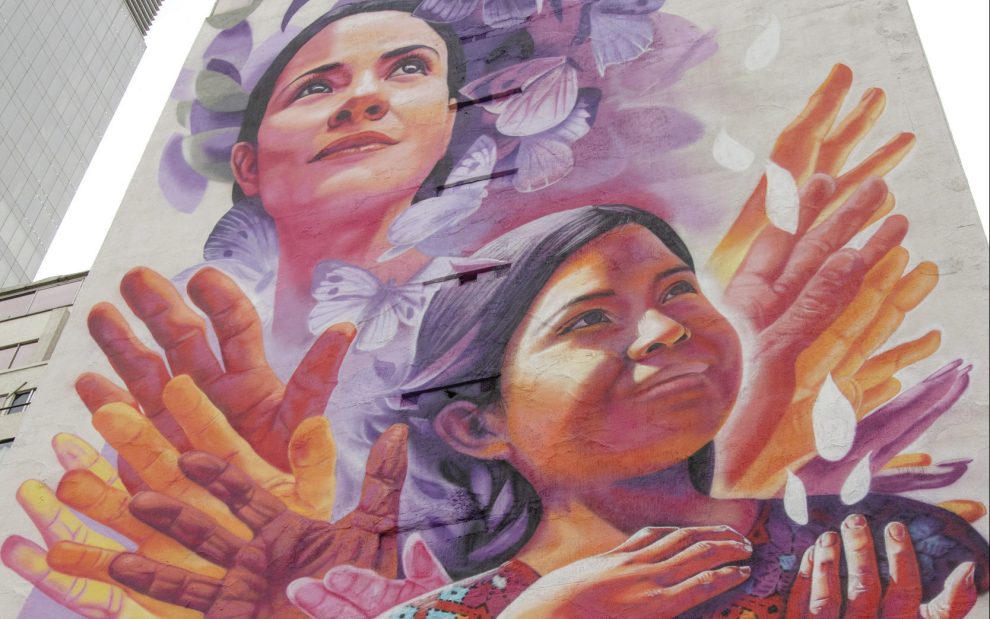The new year offers the church and the world a new opportunity to explore a nuanced version of its preferential option for the poor, one that emphasizes a more tender and grateful appreciation of women. Women are disproportionately among the poor, not only materially but also according to a gamut of other social measures. Especially during the COVID-19 pandemic, women have been asked to bear the greatest burdens in poverty, neglect, and violence.
On that last point Pope Francis spoke forcefully during Mass on New Year’s Day, the Solemnity of Mary, in Vatican City. “The Church is Mother; the Church is woman,” he said. “And since mothers bestow life, and women ‘keep’ the world, let us all make greater efforts to promote mothers and to protect women. How much violence is directed against women! Enough! To hurt a woman is to insult God, who from a woman took on our humanity.”
Violence against women comes in many forms. At its roots it is not metaphorical or subtle but direct and deadly—especially now as COVID-19 generates unprecedented levels of economic and personal dislocation. The crisis harbors a shadow pandemic: record levels of domestic violence and femicide around the world. It is a scourge that calls for an unceasing examination of conscience among men and a revised consideration among parents, obviously fathers foremost, regarding the modes of thinking and behavior they pass on to children.
In his homily Pope Francis reminded us that Mother Mary no doubt gazed in joy and wonder but perhaps also with no small sorrow upon the “scandal of the manger.” How great were her anxieties contemplating her child’s humble state during a time of political unrest and economic uncertainty? Did she worry over how heavy the burden of his care would be upon her shoulders alone?
In our times, young men are not visited in dreams and implored to stay with their loved ones. They flee from the challenges of parenting and adulthood, abandoning family-making to women alone. The Pew Research Center reported in 2019 that the United States had the highest share of children living in single-parent households in the world—23 percent, more than three times the average global share. Almost 80 percent of those households are led by women. The COVID-19 pandemic has exacerbated those trends.
Poverty itself does a different kind of violence to women. Women have endured the worst economic effects of the pandemic. Labor sectors that suffered the highest job losses, such as service and hospitality, had higher percentages of female workers—nearly 70 percent of low-wage jobs lost had been held by women.
And of course within the church, violence against women can take many forms, from the direct violence of sexual assault by clerics, evident in reports of rape and exploitation that still have the power to shock, to the violence of structural exclusion and silencing. Pope Francis has done much to advance women into leadership positions, but how much real progress can be made when discussion about more meaningful, credible roles for women in the church is not even allowed to begin?
A world in conflict, despite prattle about human rights and the sophistication of the weapons at our disposal, still makes women and children victims of war-making.
Advertisement
Finally, a world in conflict, despite prattle about human rights and the sophistication of the weapons at our disposal, still makes women and children victims of war-making. In conflicts in Yemen, Myanmar, and other countries around the world, professional soldiers and insurgents alike make insufficient efforts to protect noncombatants. Women and children have been made to suffer the most.
The violence against women that exasperated Pope Francis in his survey of the year before us is broad and real and for too many women inescapable. If rhetoric to “build back better” in the aftermath of the COVID-19 pandemic still has any force to it, a good place to begin would be to join with Pope Francis in declaring “enough.”
This article also appears in the March 2022 issue of U.S. Catholic (Vol. 87, No. 3, page 42). Click here to subscribe to the magazine.
Image: Flickr/UN Women/Dzilam Mendez














Add comment